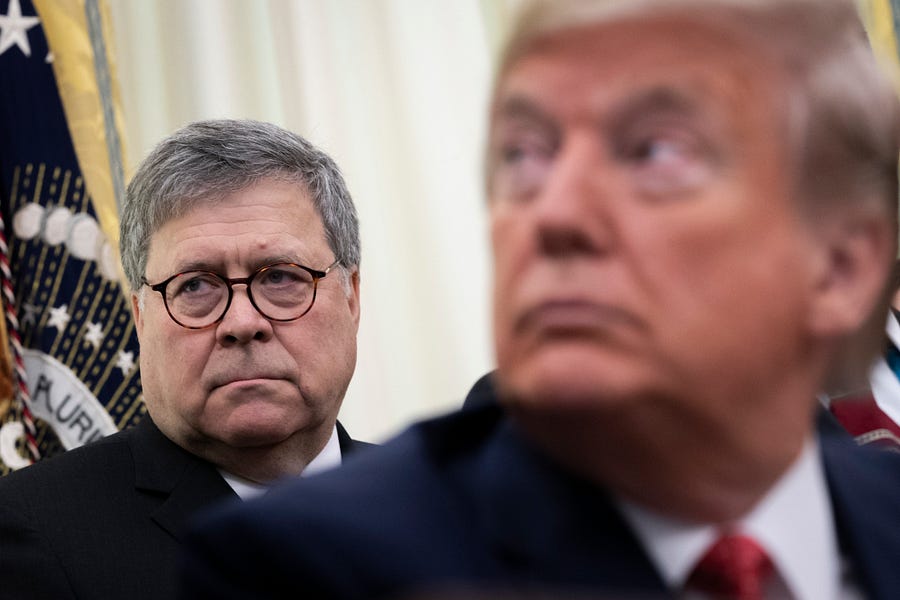To understand the significance of President Trump’s intervention in Justice Department guidance about the Roger Stone sentence, consider President Barack Obama’s interview with Steve Kroft on 60 Minutes on October 11, 2015. Kroft asked Obama about the Hillary Clinton private email investigation. Obama said that Clinton’s email use was a “mistake” but that the issue had been “ginned up in part because of politics” and was “not a situation in which America’s national security was endangered.” Obama added: “We don’t get an impression that here there was purposely efforts … to hide something or to squirrel away information.”
Obama made similar points in an interview with Chris Wallace on April 10, 2016. “I can tell that you this is not a situation in which America’s national security was endangered,” he said. Obama added that Clinton “would never intentionally put America in any kind of jeopardy,” and then suggested that Clinton did not have highly classified information on her server. When Wallace asked for assurances that there would be no political influence on the investigation, Obama said: “I do not talk to the attorney general about pending investigations. I do not talk to FBI directors about pending investigations. We have a strict line, and always have maintained it.”
Obama here correctly described the norm that had governed White House-Justice Department relations since Watergate. The problem was that his public comments about the case expressed a view about how it should be resolved—a view known in short order by both the attorney general and FBI director. By publicly talking about the case and expressing a view about the merits, Obama violated the very norm of Justice Department independence that he articulated.
This was a point that former FBI Director James Comey made in his memoir. Because “President Obama is a very smart man who understands the law very well,” Comey did not understand why he “spoke about the case publicly and seemed to absolve [Clinton] before a final determination was made.” Comey continued: “If the president had already decided the matter, an outside observer could reasonably wonder, how on earth could his Department of Justice do anything other than follow his lead?” Comey noted that Obama did not in fact know anything about the case beyond what he read in the newspapers. “But his comments still set all of us up for corrosive attacks if the case were completed with no charges brought.”
The Inspector General report on the Clinton email investigation reveals that Obama’s comments caused great consternation inside the FBI and among federal prosecutors. One FBI agent said that Obama was “prejudging the results of an investigation before they really even have been started. … That’s … hugely problematic for us.” One prosecutor told the inspector general that Obama’s statement on 60 Minutes “was the genesis of the FBI’s suspicions that the Department’s leadership was politically biased.”
The Obama episode nicely illustrates the importance of the norm against presidents commenting on ongoing investigations and prosecutions. Presidents have the authority under Article II to supervise and direct prosecutions. But because of Nixon’s abuse of Justice Department authorities to serve his personal ends, the executive branch after Watergate developed a norm against presidential and White House interference in, or comment on, ongoing federal investigations or trials.
The norm was in part designed to prevent actual corrupt interference in an investigation, especially one (like the Clinton email investigation) where the interference might serve the interests of the incumbent party or president. But just as important, it was designed to avoid the appearance of bias or corruption. The appearance of even-handed justice is vital to public confidence in the legitimacy of law enforcement—especially in politically fraught contexts. It is also vital to the confidence that career investigators and prosecutors have in political leadership.
This brings us to the Trump-Stone matter. Obama understood and supported the norm against White House non-comment on ongoing investigations but broke it a few times. That was bad. Donald Trump’s behavior here is much, much worse. It took him a long time to discover the norm, and when he did, he famously said that it was “the saddest thing.” He also attacked the norm and broke it very often in his tweet-attacks of, to take only the most prominent example, the Mueller investigation and its various trials and sentences, including its investigation into the president himself. Trump’s latest comments and criticisms about the Stone sentencing recommendation are but the latest of hundreds of violations by Trump of the norm.
Until the Stone episode, however, one could make a plausible case that the Justice Department had ignored or deflected the president’s norm-violating attempts at influence. But soon after Trump’s tweet attack on the prosecutors and the judge involved in the Stone case, the Justice Department announced it was changing course, overruled the sentencing recommendation of career prosecutors, and recommended a lighter sentence. The Justice Department denied that political considerations went into the reversal. But that was very hard to believe since the reversal was announced in light of Trump’s comments and pressure. It became harder to believe when the president tweeted: “Congratulations to Attorney General Bill Barr for taking charge of a case that was totally out of control and perhaps should not have even been brought.” No matter what went into the reversal, it now invariably seems to be a cave to the president.
All of which raises two sets of issues, one for the Republican party and one for the attorney general.
Republicans were furious when Obama prejudged the Clinton case, and when Bill Clinton visited Attorney General Loretta Lynch on the Phoenix airport tarmac, which also posed at least an appearance problem. They were furious because the president’s statements and the attorney general’s actions seemed to violate Justice Department independence and presented at least an appearance of self-serving law enforcement. That is an important principle.
But where are Republicans on that principle today, when President Trump violates it much more often and much more crassly and in much more obviously self-serving ways, all of which are enormously destructive to public confidence in law enforcement by the Justice Department? The answer is familiar but still ugly: They don’t care about the principle when ignoring it serves their political interests. Which means: They don’t care about the principle.
As for Attorney General Barr: He has contributed to the perception of politicized law enforcement by giving interviews and speeches that appear to prejudge the investigation of the origins of the 2016 FBI investigation into President Trump, and that, more broadly, indicate that he sees many law enforcement and law-compliance issues through a left-right political lens. But now he has acted in a manner consistent with the president’s overt and highly political wishes to minimize Stone’s sentence, and the president has praised him for it. Whatever the reality of Barr’s decison-making process, it definitely appears that he bowed to the president’s politically self-serving wishes.
Barr has a large conception of the president’s power to control investigations. But he is also, I still believe, a man of principle who loves the Justice Department. For his sake, and for the department’s, he needs to make the president stop barking politicized commands to the Department. Or he needs to stop acting in ways consistent with those orders and provocations. Or, if he cannot do one of those two things, he should quit.
Jack Goldsmith is Henry L. Shattuck professor of law at Harvard University and a senior fellow at the Hoover Institution at Stanford University.
Photograph of William Barr and Donald Trump at the White House by Drew Angerer/Getty Images.






Please note that we at The Dispatch hold ourselves, our work, and our commenters to a higher standard than other places on the internet. We welcome comments that foster genuine debate or discussion—including comments critical of us or our work—but responses that include ad hominem attacks on fellow Dispatch members or are intended to stoke fear and anger may be moderated.
With your membership, you only have the ability to comment on The Morning Dispatch articles. Consider upgrading to join the conversation everywhere.